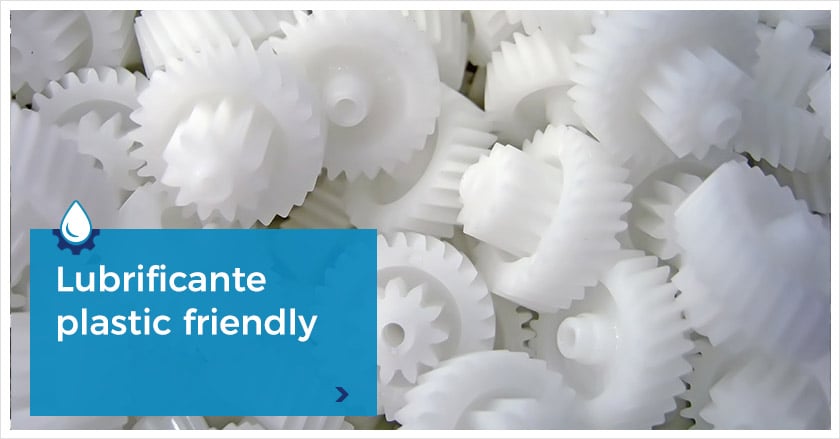
"Plastic friendly lubricant"
The compatibility of plastic materials - lubricant is a very current topic. Of course, the best way to reduce plastic waste is to optimize the use of the one already produced. On an industrial level this can translate into finding suitable (and tested) lubricants that reduce failures, deformations and excessive wear.
For better or for worse, given the great talk about environmental issues lately, plastics still play a very important role, which in many industrial sectors is very difficult to reduce.
Certainly one of the paths taken by plastics producers is that of quality, which becomes even more important and complicated when it comes to plastics that are not pure but totally or partially recycled.
In this process, the mechanical components are inevitably subjected to very particular and uncomfortable working conditions, which require constant checks and precautions with very high standards in order to function in the most correct way. Whether it is components produced on a large scale or in limited editions, it is important that the machinery is lubricated in the correct way in order not to cause any damage to the system and to the product itself, protecting it perfectly from external agents or harmful chemical components.
Plastic material compatibility: pay attention to the choice of lubricant!
The lubricants for plastics are formulated to reduce wear, noise and play, but above all they must withstand very important thermal changes, with temperatures ranging from –70 ° C to + 200 ° C.
Furthermore, their composition varies considerably according to the industry to which the plastics are destined. For this reason, the choice of the right lubricant is not simple and trivial - on the contrary, it must be well studied and above all verified.
For example, there are real guidelines for the initial selection of synthetic oil for plastic components or elastomers: esters (i.e. the lubricating bases) should be used with extreme caution with:
- polycarbonate
- polyester
- polyphenyl oxide
- polystyrene
- polysulfide
- polyvinyl chloride
- buna S
- butyl
- natural rubber and neoprene.
While fluoroethers and silicones are compatible with most plastics and elastomers.
The selection of the right lubricant for plastics is a real necessity, as in case of conditions of high mechanical stress, extreme temperatures, poor quality of the material, or - even worse - in case of a combination of many of these factors, the only guarantee supporting the lubricant for plastics is its verification through rigorous tests.
Plastic material compatibility: Polycarbonate and ABS
We often hear of plastics sensitive to chemical attack or "chemically fragile", for which the choice of the right lubricant becomes even more fundamental. But what are they?
For example, among the most common we have Polycarbonate and ABS, used a lot and in different sectors.
ABS compatibility
ABS is a very tough and impact-resistant plastic, which has a low shrinkage coefficient, high dimensional stability and good resistance to acids and bases, perfect for making portable devices such as PCs or smartphones.
Compatibility Polycarbonate
Polycarbonate, on the other hand, also has good impact resistance, a low shrinkage coefficient and good dimensional stability, but unlike ABS it has greater heat resistance, also supporting high-quality aesthetic finishes.
Both of these plastics have very low chemical resistance, so it is important to immediately understand whether the lubricant you have chosen to use for your machinery is adequate or not.
To do so, click below and download our guide on lubricants and plastics for free!
COMPATIBILITY GUIDE
Lubricants and plastics
DOWNLOAD THE FREE GUIDE



